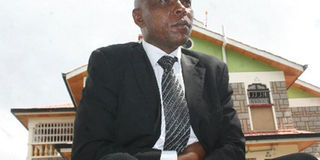ICC eyed Njenga in Uhuru case

Former Mungiki leader Maina Njenga during an interview on International Criminal Court prosecutor Fatou Bensouda in Kitengela, Kajiado on January 21, 2015. PHOTO | WILLIAM OERI | NATION MEDIA GROUP
What you need to know:
- An article in the American newspaper The New York Times claims that Maina Njenga, through his lawyer Paul Muite, had agreed to testify in The Hague, the Netherlands, and even detailed his organisation's structure and its role in the violence.
- It says that then ICC Prosecutor Luis Moreno-Ocampo admitted in an interview at the InterContinental Vienna Hotel in Austria that the evidence against President Kenyatta was not as strong as he would have liked.
Former Mungiki leader Maina Njenga was sought to testify at the International Criminal Court (ICC) after the court lacked sufficient evidence to link President Uhuru Kenyatta to the 2007-2008 post-election violence, The New York Times says.
According to an article in the paper, Mr Njenga, through his lawyer Paul Muite, had agreed to testify in The Hague, the Netherlands, and even detailed his organisation's structure and its role in the violence.
It says that then ICC Prosecutor Luis Moreno-Ocampo admitted in an interview at the InterContinental Vienna Hotel in Austria that the evidence against President Kenyatta was not as strong as he would have liked.
He said the case hinged on Mr Njenga and his people, although some Office of the Prosecutor staff worried about their reliability after President Kenyatta’s lawyer claimed in court the first two witnesses tried to extort him in exchange for information that could aid the defence and, when he refused, threatened him.
“Especially crucial were three confidential Mungiki ‘linkage’ witnesses. One claimed he saw Mr Kenyatta at meetings where attacks were planned; another, that he was told of these meetings, though he wasn’t present; and a third, that he met with Kenyatta beforehand to discuss violence,” the article stated.
It also claims that Mr Moreno-Ocampo’s office approached then Commissioner of Police Hussein Ali to testify against President Kenyatta in exchange for his acquittal. The newspaper also claims that Mr Moreno-Ocampo’s team approached Maj-Gen (Rtd) Ali as the Waki Commission, which investigated the violence, had gathered strong evidence against him. The team, it claims, had a dwindling pool of evidence.
It says Mr Moreno-Ocampo admitted that he was not prepared with enough evidence to prosecute a number of the suspects in his list and mainly relied on the 529-page report issued by the Waki Commission in October 2008 and one published by the Kenya National Commission on Human Rights.





